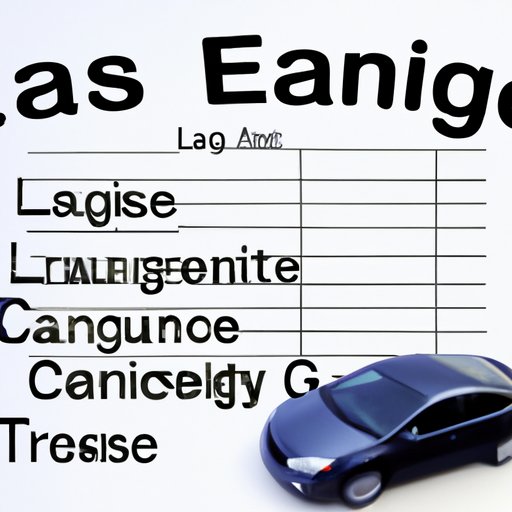Introduction
Leasing and financing are two popular options for obtaining a car. Both have their advantages and disadvantages, so it’s important to do your research before making a decision. This article will explore the differences between leasing and financing a car, including the cost comparison, tax implications, and tips for deciding which option is best for you.

Pros and Cons of Leasing vs Financing a Car
Advantages of Leasing
Leasing a car has several advantages. According to a survey by Bankrate, “Nearly three-quarters of Americans believe that leasing a car is more affordable than buying one.” The main reason for this is that leasing typically requires lower monthly payments than financing. Additionally, with a lease, you don’t have to worry about the resale value of the car or having to pay for repairs after the warranty expires. You also have the option to upgrade to a newer model after the lease term ends.
Advantages of Financing
Financing a car has its own set of benefits. With financing, you own the car at the end of the loan period, which means you can keep it as long as you want. You also have more flexibility when it comes to customization, as you can make modifications to the car without worrying about violating the terms of a lease agreement. Additionally, you may be able to get a better interest rate if you have good credit.

Cost Comparison of Leasing vs Financing a Car
Upfront Costs
When comparing the cost of leasing vs financing a car, it’s important to look at both upfront costs and monthly payments. When leasing a car, you will usually need to make an upfront payment, known as a capitalized cost reduction. This payment is usually equivalent to two or three months of the lease payments. With financing, you will need to make a down payment, which can vary depending on the lender and the type of loan you get.
Monthly Payments
Leasing usually requires lower monthly payments than financing due to the fact that you are only paying for the portion of the car’s value that you use during the lease term. On the other hand, financing requires higher monthly payments since you are paying off the entire cost of the car. Additionally, with financing, you may be able to get a lower interest rate if you have good credit, which could reduce your monthly payments.
Total Cost
When looking at the total cost of leasing vs financing a car, it’s important to factor in all of the costs associated with each option. In general, leasing a car is often cheaper in the short term, but financing a car is usually cheaper in the long term. For example, according to Edmunds, “The total cost of ownership for a leased vehicle is typically higher than for a financed vehicle over a five-year period.”

Tax Implications of Leasing vs Financing a Car
Another important factor to consider when deciding between leasing vs financing a car is the tax implications. With a lease, you are not eligible for any tax deductions, whereas with financing you may be able to deduct some of the interest payments from your taxes.
Tips for Deciding Between Leasing vs Financing a Car
Consider Your Budget
When deciding whether to lease or finance a car, the first thing to consider is your budget. Leasing typically requires lower monthly payments, but financing may require a larger down payment. Make sure to factor in all of the costs associated with each option before making a decision.
Factor in the Length of Ownership
Another important factor to consider is the length of ownership. If you plan to keep the car for a long time, then financing may be the better option since you will own the car at the end of the loan period. On the other hand, if you want the flexibility to upgrade to a newer model after a few years, then leasing may be the better option.
Look at Mileage Restrictions
Leasing typically comes with mileage restrictions, so it’s important to consider how much you drive when deciding between leasing vs financing a car. If you typically drive a lot, then financing may be the better option since there are no mileage restrictions.
Analyze the Total Cost
Finally, it’s important to analyze the total cost of leasing vs financing a car. As mentioned earlier, leasing is usually cheaper in the short term, but financing is usually cheaper in the long term. Make sure to factor in all of the costs associated with each option before making a decision.
Conclusion
Leasing and financing are two popular options for obtaining a car. Each option has its own advantages and disadvantages, so it’s important to do your research before making a decision. When comparing the cost of leasing vs financing a car, it’s important to look at both upfront costs and monthly payments. Additionally, it’s important to consider the tax implications and the length of ownership when deciding between leasing vs financing a car. By considering your budget, the length of ownership, mileage restrictions, and the total cost, you can make an informed decision about which option is best for you.
(Note: Is this article not meeting your expectations? Do you have knowledge or insights to share? Unlock new opportunities and expand your reach by joining our authors team. Click Registration to join us and share your expertise with our readers.)
